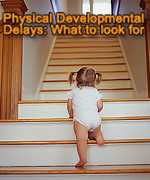Important Milestones: Your Child By Four Years
Milestone Checklist
How your child plays, learns, speaks, acts, and moves offers important clues about your child’s development. Developmental milestones are things most children can do by a certain age.
Check the milestones your child has reached by his or her 4th birthday. Take this with you and talk with your child’s doctor at every visit about the milestones your child has reached and what to expect next.
What most children do by this age:
Social and Emotional
-
Enjoys doing new things
- Plays “Mom” and “Dad”
-
Is more and more creative with make-believe play
-
Would rather play with other children than by himself
- Cooperates with other children
-
Often can’t tell what’s real and what’s make-believe
-
Talks about what she likes and what she is interested in
Language/Communication
-
Knows some basic rules of grammar, such as correctly using “he” and “she”
-
Sings a song or says a poem from memory such as the “Itsy Bitsy Spider” or the “Wheels on the Bus”
-
Tells stories
- Can say first and last name


Cognitive (learning, thinking, problem-solving)
-
Names some colors and some numbers
-
Understands the idea of counting
-
Starts to understand time
-
Remembers parts of a story
-
Understands the idea of “same” and “different”
- Draws a person with 2 to 4 body parts
- Uses scissors
-
Starts to copy some capital letters
- Plays board or card games
-
Tells you what he thinks is going to happen next in a book
Movement/Physical Development
- Hops and stands on one foot up to 2 seconds
- Catches a bounced ball most of the time
- Pours, cuts with supervision, and mashes own food
Act early by talking to your child’s doctor if your child:
- Can’t jump in place
- Has trouble scribbling
- Shows no interest in interactive games or make-believe
- Ignores other children or doesn’t respond to people outside the family
- Resists dressing, sleeping, and using the toilet
- Can’t retell a favorite story
- Doesn’t follow 3-part commands
- Doesn’t understand “same” and “different”
- Doesn’t use “me” and “you” correctly
- Speaks unclearly
- Loses skills he once had
If You’re Concerned – Act Early
Tell your child’s doctor or nurse if you notice any of these signs of possible developmental delay for this age, and talk with someone in your community who is familiar with services for young children in your area, such as your state’s public early intervention program. For more information, visit our "If You’re Concerned" web page or call 1-800-CDC-INFO.
The American Academy of Pediatrics recommends that children be screened for general development using standardized, validated tools at 9, 18, and 24 or 30 months and for autism at 18 and 24 months or whenever a parent or provider has a concern. Ask your child’s doctor about your child’s developmental screening.
“Learn the signs. Act early.” materials are not a substitute for standardized, validated developmental screening tools.
Adapted from CARING FOR YOUR BABY AND YOUNG CHILD: BIRTH TO AGE 5, Fifth Edition, edited by Steven Shelov and Tanya Remer Altmann © 1991, 1993, 1998, 2004, 2009 by the American Academy of Pediatrics and BRIGHT FUTURES: GUIDELINES FOR HEALTH SUPERVISION OF INFANTS, CHILDREN, AND ADOLESCENTS, Third Edition, edited by Joseph Hagan, Jr., Judith S. Shaw, and Paula M. Duncan, 2008, Elk Grove Village, IL: American Academy of Pediatrics.
- Page last reviewed: August 15, 2016
- Page last updated: August 15, 2016
- Content source:



 ShareCompartir
ShareCompartir